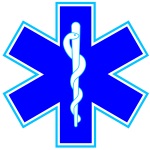Atrial Fibrillation Atrial Flutter: Difference between revisions
Created page with "==Section 4 - CARDIAC== ===4.03 ATRIAL FIBRILLATION / ATRIAL FLUTTER=== '''CONSIDER MEDICAL ETIOLOGY AND REFER TO APPROPRIATE PRACTICE PARAMETER:''' * [[Chest Pain Acute Coro..." |
|||
| Line 32: | Line 32: | ||
'''''If there is a prolonged delay or difficulty obtaining synchronization, and the patient is extremely UNSTABLE, then [[Defibrillation|DEFIBRILLATION]] should be administered.''''' | '''''If there is a prolonged delay or difficulty obtaining synchronization, and the patient is extremely UNSTABLE, then [[Defibrillation|DEFIBRILLATION]] should be administered.''''' | ||
[[Category:Cardiac]] | |||
Revision as of 01:12, 2 April 2012
Section 4 - CARDIAC
4.03 ATRIAL FIBRILLATION / ATRIAL FLUTTER
CONSIDER MEDICAL ETIOLOGY AND REFER TO APPROPRIATE PRACTICE PARAMETER:
- CHEST PAIN / ACUTE CORONARY SYNDROME (4.01).
- Hypoxia, INITIAL MEDICAL CARE (2.01).
- Toxic effects of medications or alcohol.
- Thyroid Disease.
STABLE:
- INITIAL MEDICAL CARE (2.01) - OXYGEN @ 100% via NRB mask or assist with BVM.
- If rate is greater than 150 beats/minute and narrow complex. Administer DILTIAZEM (CARDIZEM) 0.25 mg/kg IVP if the patient contact and transport time is greater than 25 minutes. If no response in 30 minutes and heart rate greater than 150, DILTIAZEM (CARDIZEM) 0.35 mg/kg IVP
- If rate greater than 150 beats/minute and wide complex refer to WIDE COMPLEX TACHYCARDIA PARAMETER (4.10)
BLACK BOX WARNING: DILTIAZEM (CARDIZEM) IS CONTRAINDICATED IN HYPOVOLEMIA AND CALCIUM CHANNEL BLOCKER USE. Use in these situations can result in severe bradycardia and refractory hypotension or cardiac arrest.
UNSTABLE:
- INITIAL MEDICAL CARE (2.01)- OXYGEN @ 100% via NRB mask or assist with BVM.
- O2 saturation, monitor in place.
- SYNCHRONIZED CARDIOVERSION @ 50 Joules.
- Consider pre-medication with MIDAZOLAM (VERSED). Start at 2-5 mg then 2 mg every 30 seconds to 1 min IVP or IN if patient is conscious.
- May repeat as necessary to allow for sedation. See ANALGESIA/SEDATION PARAMETER (2.04)
- If NO response, SYNCHRONIZED CARDIOVERSION @ 100 Joules.
- If NO response, SYNCHRONIZED CARDIOVERSION @ 200 Joules.
- If NO response, SYNCHRONIZED CARDIOVERSION @ 300 Joules.
Physician's Orders: If NO response, contact Medical Control for consult.
This Standing Order is divided between the care and treatment of the stable patient verses the unstable patient. As a matter of definition agreed upon by the Medical Directors, the UNSTABLE patient is one who presents with any of the following: SIGNIFICANT CARDIAC SYMPTOMS, SIGNIFICANT DYSPNEA, ALTERED MENTAL STATUS, OR HYPOTENSION WITH SIGNS OF DECREASED TISSUE PERFUSION, OR SIGNIFICANT COMPROMISE OF AIRWAY, BREATHING AND/OR CIRCULATION.
If there is a prolonged delay or difficulty obtaining synchronization, and the patient is extremely UNSTABLE, then DEFIBRILLATION should be administered.
